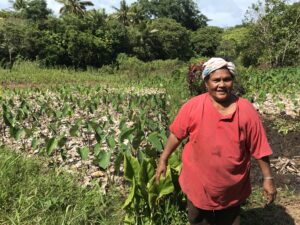
Much more than a set of regulations about what you can and cannot do in organic production, organic agriculture is principles based and these principles are the roots from which organic agriculture grows and develops.
The Pacific Organic Standard (POS) and the practice of pacific organic farmers are based on the IFOAM set of 4 internationally recognized principles; Health; Ecology; Fairness and Care. Plus one other that Pacific producers felt was central to organic agriculture in our region – Culture and Traditions.
Conventional farming puts its focus on achieving maximum yields of a specific crop. It is based on a rather simple understanding: crop yields are increased by nutrient inputs and they get reduced through pests, diseases and weeds, which therefore must be combated.
Organic agriculture is a holistic way of farming: besides production of goods of high quality, an important aim is the conservation of the natural resources fertile soil, clean water and rich biodiversity. The art of organic farming is to make the best use of ecological principles and processes.
Organic farmers can learn a lot from studying the interactions in natural ecosystems such as forests. The following section shows how principles of a natural ecosystem can be used for designing an organic farming system.
Pacific Principles of Organic Agriculture
Health – The health of the soil, which enables the production of healthy plants and animals, which in turn enhance the lives of people and their environment, are one and indivisible.
Ecology- Organic agriculture is based on living ecological systems and cycles, works with them, emulates them and helps to sustain them.
Fairness – Organic agriculture builds on relationships that ensure fairness with regard to the common environment and life opportunities. The key role of farmers and rural communities are recognised and benefits shared equitably with them.
Care – Organic agriculture is managed in a precautionary and responsible manner to protect the health and well-being of current and future generations and the environment.
Culture & traditions– Pacific organic agriculture recognises the value of contributions from traditional agricultural practices and knowledge and Pacific cultures.
These principles show that organic farming in the pacific is much more than the renunciation of agro- chemicals, but instead is a relationship of respect with the land, the micro organisms of the soil, the ecosystems and the community and it’s cultural values.